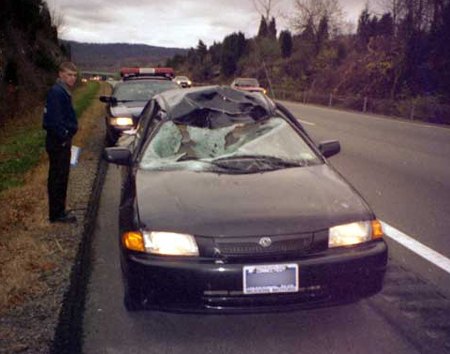Minnesota Tries Tripwire Defense Against Deer Strikes
The Insurance Institute for Highway Safety reckons some 1.5m American deer have a close encounter of the vehicular kind each year. On an annual basis, deer collisions take out 200 humans, injure 15k more and cost the insurance industry rack-up more than $1b in repairs. According to a report in the Black Hills Pioneer, researchers at the Western Transportation Institute at Montana State University have spent the last six years trying to stop the car-nage. The Big Sky boffins are currently testing a trip-wire system in Minnesota. When deer break invisible beams along the side of the road, the system triggers flashing lights to warn drivers. Bob Weinholzer from the Minnesota Transportation Department is happy with the approach. "We can't do anything to control what the deer do, so this is an attempt to control the drivers."
Glenn is a baby-boomer, born in 1954. Along with his wife, he makes his home in Connecticut. Employed in the public sector as an Information Tedchnology Specialist, Glenn has long been a car fan. Past rides have included heavy iron such as a 1967 GTO, to a V8 T-Bird. In between those high-horsepower cars, he's owned a pair of BMW 320i's. Now, with a daily commute of 40 miles, his concession to MPG dictates the ownership of a 2006 Honda Civic coupe which, while fun to drive, is a modest car for a pistonhead. As an avid reader, Glenn enjoys TTAC, along with many other auto-realated sites, and the occasional good book. As an avid electronic junkie, Glenn holds an Advanced Class amateur ("ham") radio license, and is into many things electronic. From a satellite radio and portable GPS unit in the cars, to a modest home theater system and radio-intercom in his home, if it's run by the movement of electrons, he's interested. :-)
More by Glenn Swanson


































Comments
Join the conversation
Useful if the deer run onto the road and stop; not so much when they sprint across the road as they tend to do. And yeah, you're definitely better off hitting the deer than swerving.
""We can't do anything to control what the deer do ..." But cougars can. So can wolves.
Having hit a deer, I fully agree with NOT swerving. In my case, there was no time to react anyway -- I got on the brakes immediately, but my son said we hit it before that. Our seat belts didn't even lock up -- that's how minor the hit was. Still it cost about $1,000 in damage to my '97 Camry, mainly to the hood, which had to be replaced. You don't want to swerve only to hit an oncoming car or a tree!
The closest I came to hitting a deer was, ironically, shortly after coming out of the woods. I was going around the base of a hill, and a deer suddenly appeared loping down it and into the far lane. I got that weird "time slowing down" effect, and I knew the deer was going to intersect my grille, regardless of what action I took. The only thing that saved me was that an oncoming car appeared from around the bend at that exact moment and hit it first. Oh, and guns are a pretty useful means of controlling what the deer do.